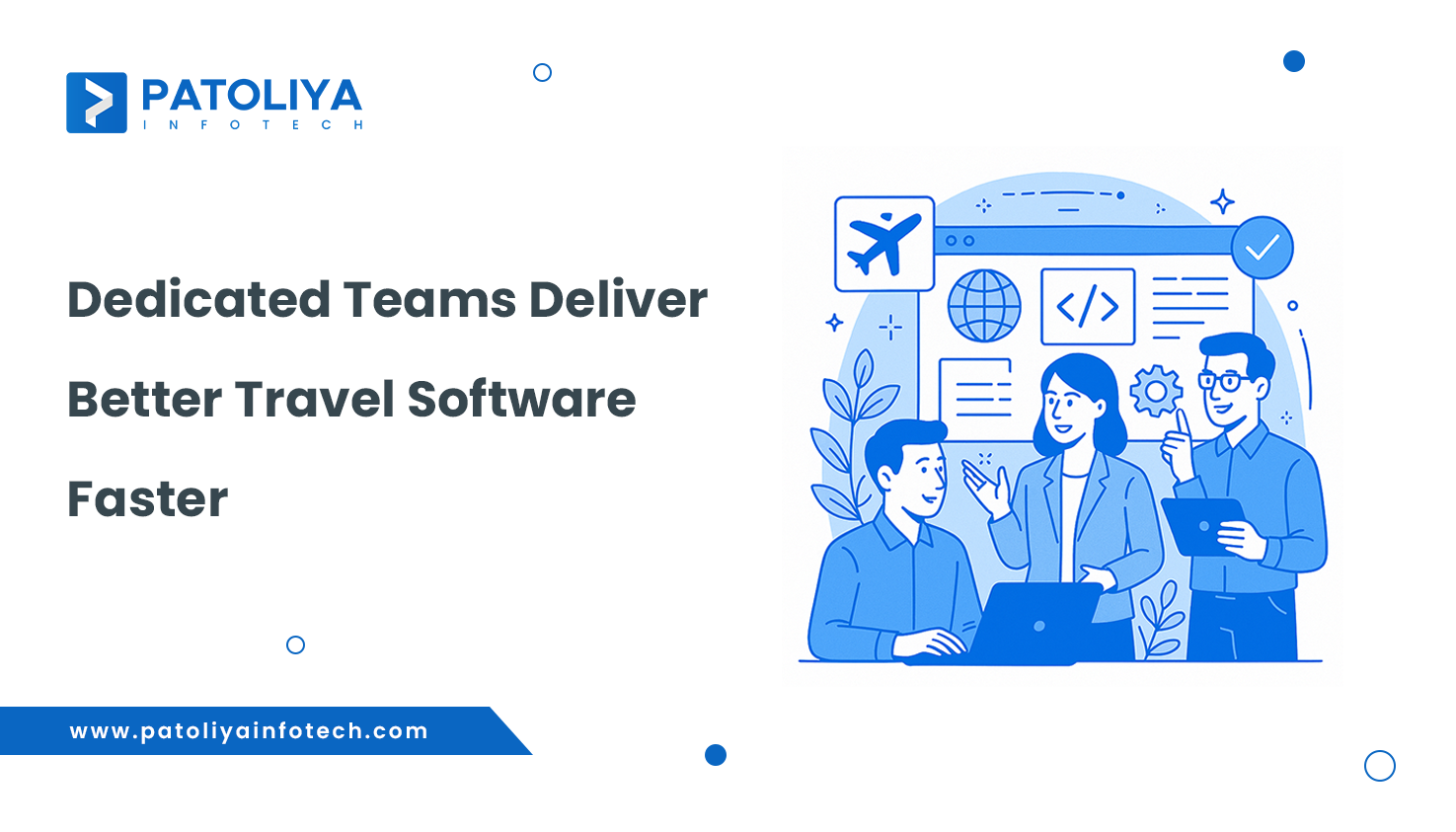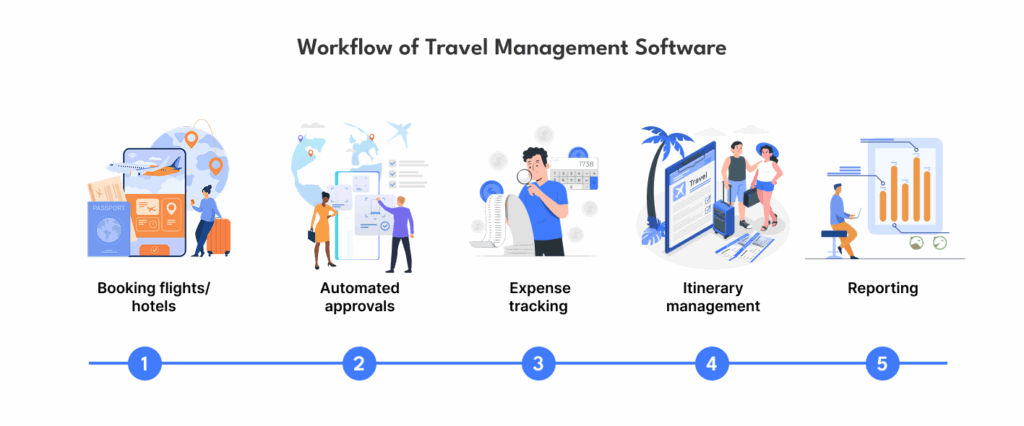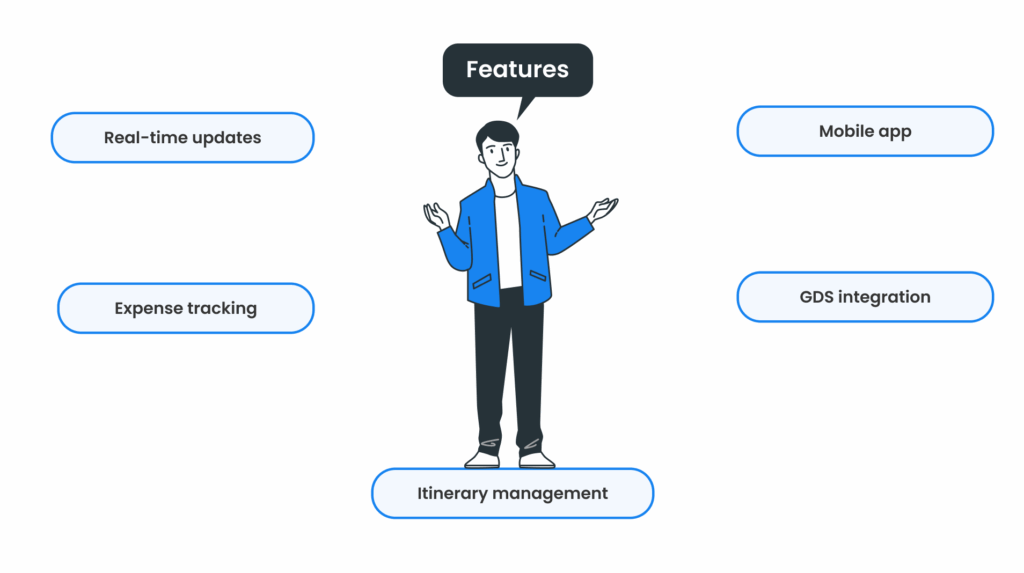Get Travel Management Right with the Right Team

Table of Contents
Whether you are managing a group of people who are traveling all over the world or just attempting to Whether you are managing a group of people who are traveling all over the world or just attempting to navigate the chaos of scheduling a multi-forestall event, route planning can easily become a full-time job. Itineraries, flights, lodging, reimbursements, and approvals all don't function well until a mechanism is in place to regulate everything. There is a more intelligent solution at that point.
A travel management software package is made to handle all the moving parts in one place. It allows agencies more control over the booking, tracking, and payment of a trip while also providing travelers with more flexibility and less stress. Consider it similar to having a virtual travel helper who never forgets, loses, or sleeps.
It's no longer just for large organizations with global offices, though. Also, it is being used by more small and mid-sized businesses. Those who manage frequent travel are starting to recognize how much time and stress buying can take.
It now takes minutes to do tasks that once took hours. Now, what was disorganized is organized. And at a time when every minute matters, that truly makes a difference.
Let's examine the real functions, how this software program helps, and why it's evolving from an optional feature to a must.
What is Travel Management Software?
Tour control software serves as a platform that facilitates the planning, e-booking, manipulation, and tuning of travel for both businesses and regular travelers—all from a single dashboard. One simplified system is used for flights, lodging, permissions, spending, and reporting, rather than five separate pieces of equipment.
It typically includes features like:
- Flight and hotel bookings (often with corporate rates)
- Travel policy enforcement, so employees don’t accidentally overspend
- Automated approvals for faster decision-making
- Expense tracking and integration with accounting tools
- Itinerary management that keeps travelers organized
- Real-time travel updates (like delays, cancellations, or gate changes)
For businesses, visibility and manipulation are increasingly more important than convenience alone. Managers are able to observe those who are present, how much they are spending, and whether or not the travel fulfills company policies. Reimbursements can be automated by finance departments. Additionally, HR may make sure everyone is safe, particularly when travel plans change suddenly.
It takes significantly less time for male or female users or smaller teams to search through emails or wait for confirmation calls. Everything is handled in a single area, swiftly, without a doubt, and with fewer surprises.
Thus, this type of software will become less of a luxury and more of a need, whether you're managing a team of ten or organizing your own overseas travels.
Who Needs a Travel Management Solution?
Corporates, Agencies, Startups & More
A dedicated trip branch is not present in every business organization. In reality, in the majority of expanding companies, an HR, administrative, or even financial staff member ends up scheduling flights and pursuing bills at the highest level of their actual work. It's laborious, ineffective, and prone to errors.
This is where travel management software makes a tremendous difference, not only for large organizations but for a wide range of individuals as well:
Corporate Teams
Whether you are sending employees to meetings with customers, change suggestions, or inter-office tours, the logistics add up quickly. Groups may really manage travel control software by setting criteria for the journey, automating approvals, and managing travel expenses all from one location. No more unreasonable reservations or unanticipated costs. Everything remains under budget, within policy, and clean for documentation.
Startups
Teams that are developing quickly cannot afford to lose time or money. Businesses benefit greatly from having a centralized way to manage travel, particularly when entering new markets or presenting to potential customers across locations. They maintain their speed while adding structure.

Travel Agencies & Consultants
More than just calendars and spreadsheets are required for agencies that handle several clients and reservations. They can keep records clean, simplify operations, and provide their clients with a professional, technologically advanced experience with the aid of travel management software. Additionally, it helps them compete in an increasingly digital environment.
Frequent Solo Travelers & Freelancers
Even independent consultants and freelancers balancing work in unique places may benefit. When a computer can enthusiastically—and accurately—complete the task of locating tour receipts and posting disorganized cost ratings, why would you want to do it by hand?
Event Planners & Logistics Teams
Making travel arrangements for buyer events, retreats, or meetings? With the help of this program, you can manage reservations in large quantities, plan itineraries, and make sure everyone gets to their destination without having to deal with spreadsheet mess and email chains.
What is a Dedicated Travel Software Development Team?
When a travel company or business decides it wants custom software—something that is tailored to its actual needs—it can either try to build it internally, outsource parts to other providers, or follow the most common solution, which is to hire a dedicated improvement team.
What is a specialized tour software development team, then?
It is a team of experts (usually developers, designers, QA testers, project managers, and many more) who work full-time on your travel tech product, functioning as an extension of your internal team but without the expense of recruiting, onboarding, and managing full-time staff. Consider them your own team of experts, only concerned with building exactly what you want and ensuring that it functions flawlessly.
Who’s Usually on the Team?
A solid travel software development team typically includes:
- Project Manager – The glue. Keeps communication clear and progress on track.
- Frontend Developer(s) – Build what your users see and interact with.
- Backend Developer(s) – Handle all the behind-the-scenes logic, data, and APIs.
- UI/UX Designer – Makes sure the product isn’t just functional, but intuitive and good-looking.
- QA Engineer – Catches bugs before your users do.
- Business Analyst (optional) – Connects your goals to real-world features, ensuring what’s built is what’s actually needed.
Why It Works So Well
Focus is what makes a committed team work so well. A dedicated workforce puts their all into your job, unlike independent contractors or big agencies that manage several customers. deeper expertise, quicker iterations, and improved teamwork.
It works well in the travel industry, where software needs to take into consideration complex reservation engines, user portals, dynamic pricing, GDS (Global Distribution Systems) connections, and occasionally even regulatory compliance. Smarter solutions and fewer compromises result from having a team that is passionate about your product every day.
Additionally, the group may grow with your business. Need a mobile app released? Incorporate a mobile developer. Have a need for deeper data equipment? Bring a fact-finder in. The version may be expanded and is adaptable.
Do you want your travel software done right—with the kind of attention and care it really needs—a Dedicated Travel Software Development Team isn’t just an option. It’s a smart move.
Why Hiring a Dedicated Travel Software Development Team Just Makes Sense
You need more than just a few freelance developers and crossed palms if you are building something serious in the tour industry, such as a booking platform, business trip site, or bespoke mobile app. You want a crew that is committed to your mission, understands your objectives, and develops as if they were a member of your team. A committed team delivers just that to the desk.
Here's why extra travel companies are choosing this path, because it really does work:
1. They’re All-In on Your Product
Unlike companies juggling five other customers, a dedicated crew is laser-focused on your platform. They examine your business inside out, assume beforehand, and construct lengthy-time period goals in thoughts—now not simply quick wins.
2. You Get the Right Skills, Right Away
From reserving engine integrations to actual-time tracking and complicated backend logic, travel software program isn’t customary. A committed group brings together exactly the abilties you want—not anything greater, nothing much less.
3. Faster Development, Fewer Headaches
Because they’re fully aligned with your roadmap, dedicated teams can move faster. No repeated briefings. No endless onboarding loops. Just one team, one direction, and real momentum.
4. Flexibility as You Grow
Need to scale up? Add capabilities? Launch a cellular version? A committed team model helps you to increase (or agreement) based on what your product needs—with out starting from scratch whenever.
5. You Keep Full Control
You're no longer handing off your idea—you’re partnering with a crew that reviews without delay to you. That approach ordinary check-ins, obvious development, and decisions that live for your fingers.
6. Better Communication, Less Chaos
With a single factor of touch and a team that works like your own, you don’t wander away in translation. Everyone’s on the same page, speaking the identical language—yours.

How to Choose the Right Development Partner
Choosing the right group to construct your tour platform isn’t pretty much code—it’s about trust, vision, and getting matters completed the proper way. Here’s the way to ensure you’re choosing a companion that’s certainly worth partnering with:
✅ Look for Real Travel Industry Experience
You don’t want a crew mastering approximately GDS integrations or OTA workflows on your dime. Look for developers who’ve constructed travel systems before. Bonus points in the event that they understand such things as dynamic pricing, itinerary control, and journey coverage enforcement.
✅ Check Their Tech Stack & Tools
Are they on top of things with the tools and frameworks that be counted? Whether it is cloud infrastructure, cellular development, or stable price integrations—ensure they’re now not simply talking.
✅ Dig Into Their Portfolio & Case Studies
Look at what they’ve constructed. Do the tasks feel polished? Are they scalable? Have they solved problems much like yours? A desirable case take a look at will tell you what the mission turned into, how they tackled it, and what results they added.
✅ Read What Their Clients Are Saying
Testimonials and opinions (mainly on platforms like Clutch or LinkedIn) provide you with a feel for what it’s definitely want to paintings with them. Look for patterns: Do customers point out clean verbal exchange? Fast turnaround? Solid assist after launch?
✅ Ask About Communication & Workflow
Do they use agile? Weekly sprints? Daily stand-ups? A exceptional group is one that continues you inside the loop and adapts to your selected way of running—with out making you chase updates.
✅ Think Beyond the Code: Culture Fit Matters
If you’re going to paintings carefully with a crew for months (or years), shared values and running styles go a long way. Do they ask smart questions? Show curiosity about your commercial enterprise? Feel like human beings you may consider?
✅ Be Smart About Pricing & Contracts
Hourly, fixed price, milestone-primarily based—apprehend what you're getting and what it’ll fee. Transparent terms, clear deliverables, and flexibility are key. If it sounds too excellent to be real, it possibly is.
Choosing the right development partner is half the battle. Get this part right, and the rest of the journey becomes a lot smoother.
Benefits of a Dedicated Travel Software Development Team
When it comes to constructing tour software that actually can provide, having a committed group in your facet changes the whole thing. It’s not pretty much getting code written—it’s about gaining a accomplice who’s invested to your fulfillment from day one. Here’s why a dedicated journey software program development team stands proud:
1. Deep Focus on Your Vision
No distractions, no juggling more than one customers. The whole team is dedicated to your venture, which means every line of code, each layout selection, is made with your dreams in thoughts.
2. Faster Time to Market
With everyone synced up and targeted, development movements at a constant, dependable pace. You avoid the lower back-and-forth delays and get your product out faster—vital in a competitive journey market.
3. Tailored Solutions, Not Off-the-Shelf
Travel businesses are unique. A dedicated group crafts custom functions designed particularly for your workflow, consumer needs, and growth plans, in preference to forcing you into commonplace templates.
4. Scalability When You Need It
As your tour business grows, your software program desires exchange. Dedicated teams offer the ability to quick add assets, integrate new tech, or pivot without beginning over.
5. Transparent Communication & Collaboration
You’re in no way inside the darkish. Regular updates, clear milestones, and open channels mean you always recognise what’s happening and may offer remarks in real-time.
6. Cost-Effective in the Long Run
While it might seem like a bigger investment in advance, avoiding pricey fixes, miscommunications, and rebuilding makes a dedicated team a smart economic desire through the years.
7. Quality & Reliability You Can Trust
With dedicated QA and continuous testing baked into the technique, your software won’t just be paintings—it’ll carry out smoothly underneath pressure, giving your customers a continuing enjoyment.
Partnering with a dedicated journey software improvement crew isn’t pretty much constructing software. It’s about building the future of your travel commercial enterprise—with a bit of luck, efficiently, and with a team that’s clearly invested for your achievement.
Potential Challenges and How to Overcome Them
Building travel software with a dedicated team sounds great — but like any big project, there are bumps along the way. Knowing the usual challenges upfront helps you steer clear or tackle them fast before they become roadblocks. Here are six common pitfalls and how to dodge them like a pro:
1. Unclear Project Scope
The Problem: When goals and features aren’t clearly defined, projects stretch out, budgets balloon, and frustration sets in.
Pro Tip: Start with a detailed project roadmap and requirements document. Keep it flexible but specific. Regularly revisit it with your team to stay aligned.
2. Poor Communication
The Problem: Misunderstandings, missed deadlines, and surprise changes often come from gaps in communication.
Pro Tip: Set up regular check-ins, use collaboration tools, and encourage open, honest updates. Make sure everyone knows the preferred channels and frequency.
3. Cultural & Time Zone Differences
The Problem: When your team is halfway across the globe, time differences and cultural gaps can slow progress or cause friction.
Pro Tip: Choose a team with overlapping work hours or plan for flexible meetings. Foster cultural understanding by sharing work styles and expectations upfront.
4. Scope Creep
The Problem: Adding new features mid-project without adjusting timelines or budgets can derail delivery.
Pro Tip: Prioritize features early and handle changes through a formal change management process. Keep the big picture in focus and save nice-to-haves for later phases.
5. Inadequate Testing
The Problem: Skipping or rushing testing leads to buggy software and unhappy users.
Pro Tip: Make QA a continuous process, not an afterthought. Include automated tests and real-world user testing to catch issues early.
6. Ignoring Post-Launch Support
The Problem: Launch isn’t the finish line. Without proper maintenance and updates, software quickly becomes outdated or breaks under new demands.
Pro Tip: Plan for ongoing support contracts and regular updates. Keep your team on retainer or build a clear roadmap for future improvements.
Knowing these common pitfalls—and having a game plan to avoid them—means your dedicated travel software development project has a much smoother ride from start to finish.
Top Features to Include in Your Travel Management Software
Great travel management software isn’t just about booking flights and hotels—it’s about making every step of the journey smarter, smoother, and more connected. Here are the must-have features that turn a good platform into a game-changer:
1. Automated Booking & Approvals: Cut out manual back-and-forth. Your software should automatically check travel policies, route requests for approvals, and book flights or hotels—saving time and keeping everything compliant.
2. Real-Time Travel Updates: Delays, gate changes, cancellations—travel is full of surprises. Integrated notifications keep travellers and managers informed instantly, so everyone can adjust plans without stress.

3. Expense Tracking & Integration: From booking to reimbursement, managing travel expenses can be a headache. The right software tracks costs automatically and connects seamlessly with your accounting or ERP systems.
4. Advanced Reporting & Analytics: Understanding travel spend is key to smart budgeting. Look for customizable reports that show trends, policy compliance, and opportunities to save.
5. Integration with Global Distribution Systems (GDS): Access to real-time inventory from airlines, hotels, and car rentals means better availability and prices—right inside your platform.
6. User-Friendly Itinerary Management: Travelers need more than bookings—they need a clear, consolidated itinerary that updates automatically and is accessible on mobile.
7. Policy Enforcement & Customization: Set rules that match your company’s travel guidelines—whether it’s preferred airlines, hotel classes, or budget limits. The software should enforce these automatically without killing flexibility.
8. Mobile Accessibility: Travel happens everywhere. A mobile app or responsive design ensures your team can manage trips, get alerts, and submit expenses on the go.
9. Multi-Currency & Multi-Language Support: If your team travels internationally, make sure your software speaks their language and handles currency conversions effortlessly.
Adding these features creates a travel management system that’s not just functional but truly empowering—helping companies save money, keep travellers happy, and maintain control.
Why Patoliya Infotech Stands Out
At Patoliya Infotech, we consider that a committed improvement crew need to sense like an extension of your very own business—no longer only a dealer. That’s why we prioritize deep collaboration, obvious communique, and a actual understanding of your travel industry challenges from day one. Our groups aren’t simply professional coders; they’re trouble solvers who invest themselves completely on your task’s achievement.
What surely sets us apart is our flexible, patron-first method. Whether you want to scale speedy, integrate complicated structures, or launch modern capabilities, we tailor our team shape and workflows to fit your precise needs. We combine technical excellence with a ardour for journey technology, making sure your software is not simplest strong and dependable but also designed to maintain your users delighted and your business in advance of the curve.

Conclusion: Scaling Smarter with the Right Travel Tech Partner
Travel management software program has converted the way agencies and travelers navigate the complexities of booking, coverage compliance, and cost tracking. When paired with a devoted improvement group, it will become a powerful asset—turning in tailored solutions, faster innovation, and the power needed to keep tempo with a unexpectedly converting journey landscape.
Choosing the proper companion isn’t just about technical capabilities; it’s approximately finding a team that is aware your vision, communicates virtually, and stays committed every step of the way. With the right approach, your journey software program gained’t just meet expectations—it'll increase your whole tour control experience, making each adventure smoother, smarter, and more efficient.
If you’re ready to take your journey technology to the next stage, partnering with a devoted crew like Patoliya Infotech might be the game-changer your commercial enterprise needs.



